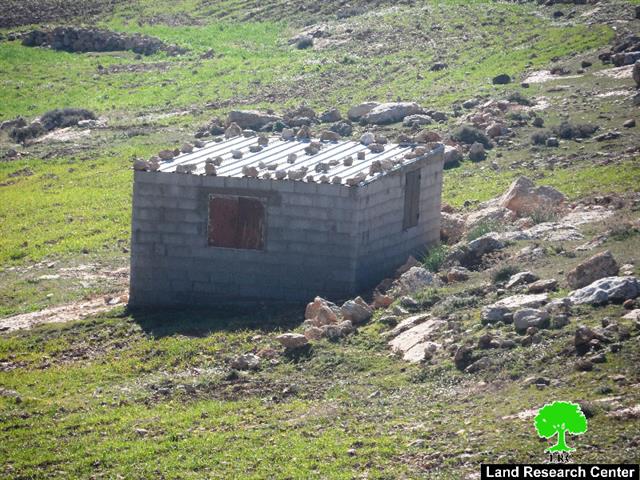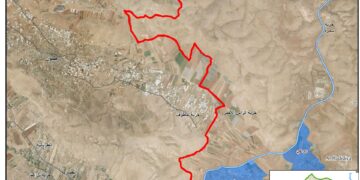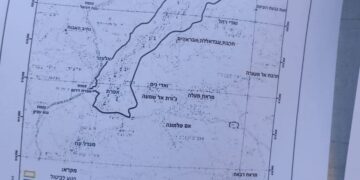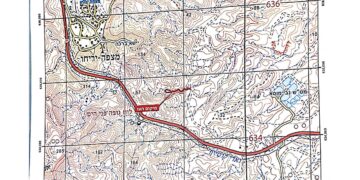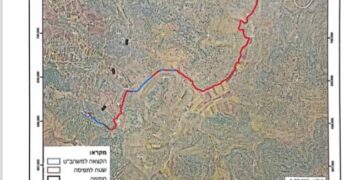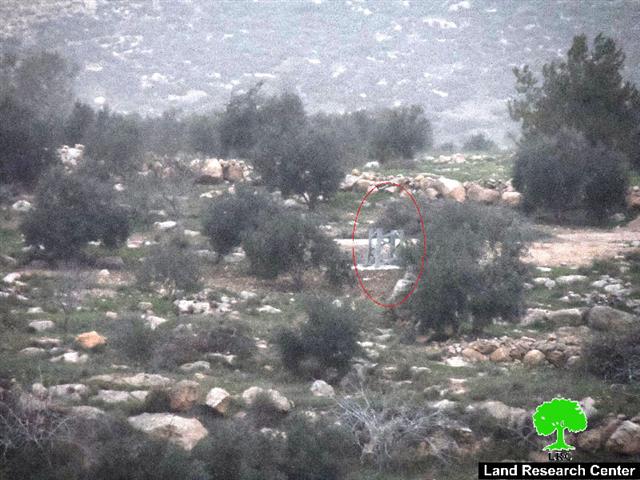- Violation: serving stop-work orders on structures
- Location: Al-Deirat and Al-Rifa'iyya villages- Hebron
- Date: January 11, 2016
- Perpetrators: Israeli Occupation Forces
- Victims: four families
Details:
The Israeli occupation authorities served on January 11, 2016 stop-work orders on agricultural structures, a house and water well in the village of Al-Deirat, east Yatta town.
A member of the village council, Mohammad Al-Adra, told Land Research Center that a vehicle relative to Israel Civil Administration raided the area of AL-Hayyeh, southeast the village, issued the orders and took photos of the structures before the force had left.
The orders mentioned that the structures were "unlicensed" and ordered a halt on construction works. February 01, 2016 was assigned as the hearing session of the Regional Inspection Committee – the Israeli Occupation Civil Administration in the court of Beit El to consider whether to demolish the structures or restore their previous status.
Demolition orders on the residence of Hasan Raba'i:
Citizen Raba'i received stop-work order on his house and barrack for sheep. This was not the first time the citizen receives such orders. Raba'i got his residence demolished many times before.
It is reported that the dozers of the occupation demolished on January 20, 2015 the residence of Hasan Raba'i and the residence of his brother Hussni in addition to a barrack for sheep owned by Hasan's father. (link of report)
After the demolition operation, GVC organization gifted the affected citizens metal slaps residences that were ready for moving in on December 12, 2015. The residences were set up on a plot owned by the citizens.
Three weeks later, the Israeli occupation authorities notified the new residences of stop-work on the claim of "unlicensed construction". Land Research Center documented this incident in the following report (link).
Hussni Raba'i said that his family suffered from the new residences given that they are made of metal slaps, which increase heat in summer. Not only, the houses being located in the middle of a mountain caused the house to sink in water during winter, not mentioning the cold condition the family endured due to the metal slaps materials. As a result, the citizen and his family built a brick house on a plot owned by his father in the area of Al-Hayyeh, southeast the village.
New threat by the new year:
Hussni built a brick house to shelter his family and moved the barrack that was gifted for him by GVC after getting his houses demolished in 2014. On January 11, 2016, the Israeli occupation authorities served stop-work order on the new house and the moved barrack (25m2).
Hussni's house is reported to be built of cement bricks and roofed with metal slaps. The 65m2 structure is home for six members including 4 children. The house is reached to through an unpaved road that is linked to the main road. Not only, the house is lit by propane for electricity grid is far from the area.
Photos 1-2: the orders on Hussni's structures
Photos 3-6: the structures of Hussni that are notified of stop-work
Stop-Work order on agricultural project and water well:
The Civil Administration then moved to the land of citizen Mahmoud Al-Adra, who was preparing for establishing an agricultural barrack for cows on a one dunum land and delivered the owner a stop-work order on the barrack and another one on water well. Noteworthy, the well (300m3) was constructed in 2013 through Palestinian Hydrology Group to help the citizen start up agricultural project on his land.
Photos 7-10: the military orders and AL-Adra's structures
Stop-Work order on agricultural room:
It should be marked that the Civil Administration served a stop-work order on agricultural room owned by citizen Ibrahim Al-Adra on the claim of unlicensed construction. The room is reported to be of 16m2 in area and is built by cement bricks and roofed by metal slaps. Al-Adra used the room as a storage unit for manual tools he uses in his four dunum plot cultivated with winter crops.
Land Research Center documented forty four stop-work and demolition orders on residential and agricultural structures since 2008. As a result, seven structures were demolished and a road was ravaged in 2012 (see report). Not only, colonist torched on December 31, 2014 a residence in Madama town, leaving huge losses and damage (See report).
About Al-Deirat :
Al-Deirat village is located to the east of Yatta town and is about 6km away from it. The village is considered agricultural and is inhabited by 700 people; a village council runs the affairs of al-Deirat despite there is no headquarter for the council itself.
A number of families reside in the village namely : (al-Hamamdah, Musa'fieh , al-Adra); al-Deirat is split by the bypass road no. 60, which links all Israeli colonies in the north with those in the south.
The village is edged by Arab al-Ka'abna and al-Karmel colony from the east, Yatta town from the west, Khirbet al-Bwaib from the north and Ma'on colony and Um Lisfa village from the south .Residents of the area aspire to obtain a master-plan for the village that includes their houses in order to protect them from Israeli orders of stop-work and demolition.
Prepared by
The Land Research Center
LRC

